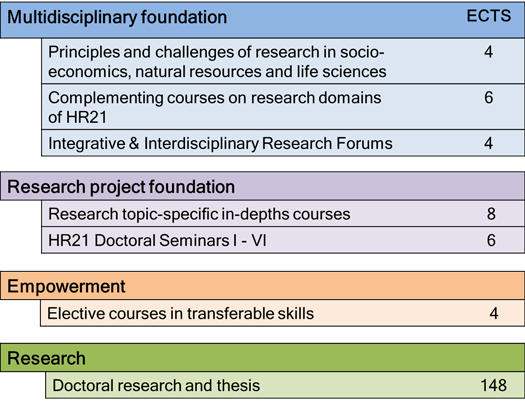CURRICULUM
HR21 provides guidance for doctoral candidates to gain interdisciplinary competencies and to apply the achieved knowledge in solutions for real world challenges - hence closing the gap between science and societal demands in the aquatic ecosystem and resource management sector.
HR21 alumni are qualified to excel in interdisciplinary and international environments, either in the scientific community or in stakeholder institutions, such as policy/administration sector, international authorities/agencies and the private sector.
The curriculum of the Doctoral School HR21 is structured into 32 ECTS of taught courses and 148 ECTS for the doctoral research/thesis - hence, 180 ECTS in total.

PRINCIPLES AND CHALLENGES OF RESEARCH IN SOCIO-ECONOMICS, NATURAL RESOURCES AND LIFE SCIENCES (4 ECTS)
This introductory course provides interdisciplinary exposure and an overview on research domains at BOKU. The course is mandatory for all doctoral candidates at BOKU, hence networking among doctoral candidates is stimulated.
COMPLEMENTING COURSES (6 ECTS)
Three complementing courses (3 ECTS each) are specifically designed for HR21 doctoral candidates, involving HR21 faculty members as well as external lecturers. Each course provides deeper understanding and competencies in one of the three HR21 research domains of natural sciences, engineering, and social sciences & humanities. Doctoral candidates have to select courses, which are capturing two research domains, which are not covered well within their prior training – hence, two, out of the three courses are mandatory elements of the HR21 curriculum.
Courses topics:
- Integrating landscape and aquatic ecology and hydrological sciences
- Integrating social and economic processes
- Integrating different aspects of engineering sciences
INTEGRATIVE & INTERDISCIPLINARY RESEARCH FORUMS (4 ECTS)
The mandatory integrative & interdisciplinary research forums are designed to deepen the interconnection of HR21 research domains and the interdisciplinary competencies of doctoral candidates and to ensure the input of external experts/stakeholders groups. The forums bridge research disciplines, emphasise integrated approaches, discuss and evaluate interdisciplinary concepts/projects in a very interactive setting with contributions of various national/international experts and representatives of relevant stakeholder groups.
HR21 DOCTORAL SEMINARS I – VI (1 ECTS each, in sum 6 ECTS)
Within the HR21 doctoral seminars, doctoral candidates attend journal club sessions (doctoral candidates present and discuss articles of relevance published in renowned journals) and present the progress in their research project. The mandatory doctoral seminars provide a platform for interdisciplinary discussions and enhanced communication among HR21 students and faculty members.
RESEARCH TOPIC-specific IN-DEPTHS COURSES (8 ECTS)
Doctoral candidates have to select courses to the amount of 8 ECTS, which provide deeper insights into the specific research areas of their doctoral project. Courses can be taken at BOKU or any other universities in Austria or abroad. HR21 highly recommends taking at least one in-depths course at an international partner institution, in particular during the research stays abroad.
EMPOWERMENT COURSES (4 ECTS)
Depending on their needs, HR21 doctoral candidates can freely elect from a wide range of courses in transferable skills offered at BOKU or any other (inter)national university. These empowerment courses should support them not only during their doctoral research, but importantly prepare them for their future career inside or outside of academia.
On request of the doctoral candidates HR21 has started to offer a special designed course in scientific writing, tackling the challenges involved in writing publications in an interdisciplinary context. The course „Writing interdisciplinary papers: A hands-on course“ is not a training course for writing, but an integrated course teaching reading, writing and making strategic choices as to publications. A particular emphasis is placed on learning to receive and give feedback. Examples of good and not-so-good interdisciplinary papers are used to study the “how-to” of being published in interdisciplinary fields by elucidating the implicit and explicit conventions of communication via research papers.
Curriculum related measures to ensure the achievement of HR21 goals
ANNUAL RETREATS
HR21 organizes Annual Retreats mandatory for all Faculty members and doctoral candidates. In addition, guest speakers and members of the international advisory board are invited to join. The annual events are important to monitor/evaluate the PhD projects, to disseminate research results, to discuss student feedback and to foster interdisciplinary understanding. These events are held in a creative atmosphere, including team-building sessions, field-visits to interdisciplinary case-study sites and at least half a day is organized by HR21 students on topics of the students’ preference. All HR21 students have to present their research progress to the audience during each retreat.
CONFERENCES & RESEARCH STAYS ABROAD
To increase the international perspective and complement methodological and related disciplines relevant for their research, all doctoral candidates are strongly encouraged to present their findings at International Conferences and to go for research stays abroad (4-6 months).
